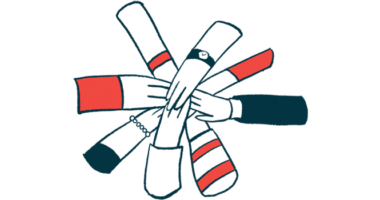In-person Engagement Can Help Foster Imitation in Children With Angelman Syndrome

In-person social engagement is more important for fostering imitative behaviors in children with Angelman syndrome than in typically-developing children, a new study suggests.
The study, “Imitation in Angelman syndrome: the role of social engagement,” was published in Scientific Reports.
People with Angelman syndrome (AS) typically have abnormal cognitive function, and often experience difficulty in social engagement. Nonetheless, they often have a strong desire to engage socially and exhibit more laughing and smiling behaviors at a young age than their typically-developing peers.
“The co-existence of social communication difficulties with a distinctive drive for social engagement in children with AS provides a puzzling phenotypic expression, with important implication for treatment and research on typical and atypical social communication development,” the researchers wrote.
However, little research has been published in this area, due in part to the complexity of designing experiments that can appropriately assess complex behaviors that are important for social interaction.
One such behavior is imitation, or doing something after watching another person do it, which is a key part of socialization and learning.
“The current study provides the first controlled examination of imitation in children with AS, using a novel experimental paradigm designed to test how imitation varies according to the social context,” the researchers wrote.
The experimental paradigm essentially consisted of having children with or without Angelman watch an adult demonstrate an activity with an object — for example, placing a ball on their shoulder — and then watching to see if the child mimicked that behavior.
“The rationale for not providing explicit instructions and not using verbal communication was to avoid the confounding factor of understanding verbal instructions, given the severe communication difficulties in [AS],” the researchers wrote.
Variations of this basic setup were tested, including having the adult demonstrator be physically present or be shown on a video. In some tests (for both in-person and on video), demonstrators would be happy and playful, which was meant to engage the children, when they performed the activity. In other tests, the demonstrator would exhibit neutral emotions.
Using this setup, the researchers evaluated 23 children with Angelman, as well as 21 typically-developing children. The Angelman group was chronologically older (mean age 11.8 vs. 1.9 years), but the two groups had similar mental ages (i.e., cognitive ability), as determined by the Griffiths Mental Developmental Scales–Extended Revised.
In the in-person experiments, children with Angelman imitated 73.9% of the actions that were performed playfully, whereas they imitated 45.65% of the actions performed neutrally. In contrast, the typically-developing children had a similar imitation frequency for actions that were playful (69.05%) and neutral (61.9%).
“There was a significant increase in the frequency of imitation in the playful condition compared to the neutral one in the [AS group], which was not observed in the [typically-developing group],” the researchers wrote.
Additionally, in the Angelman group, playful actions were more commonly imitated correctly than neutral actions (47.82% vs. 27.88%), whereas imitation accuracy for both playful and neutral actions was similar in the typically-developing group (48.21% and 45.38%).
Results for the demonstrations done on video were generally similar to the in-person results. However, of note, children with Angelman imitated significantly more frequently when there was an in-person demonstrator being playful. In contrast, no significant differences between video and in-person imitation was found for the typically-developing children.
“Although we found no overall imitation deficit in AS, we found differences in how imitation was modulated by the social context in AS compared to typical young children,” the researchers wrote. “Specifically, individuals with AS appeared to be more influenced by two social factors, namely the playful versus neutral affect the demonstrator showed, and physical presence of a demonstrator versus a video-recorded demonstration.”
Across both groups, mental age was generally correlated with more frequent and accurate imitations. In other words, children with more advanced cognitive abilities were more likely to perform imitations, and to do so correctly.
“Overall,” the researchers wrote, “our results suggest that in individuals with AS the role of social engagement in driving imitative responses is more relevant than in infants and toddlers with similar mental age, and children with other neurodevelopmental conditions such as [autism].”
“These findings may have direct implications for treatment, whereby imitation might be targeted in the context of socially engaging activities with a lively and animated adult, rather than less socially engaging strategies such as video-modeling,” they added.






